Annie Bradbury has never been diagnosed with seasonal affective disorder, but she definitely feels a difference when daylight saving time ends.
“When it’s dark when you go to work,” she said, “and when you get off work.”
That one less hour of sunlight later in her day saps her energy, leaving her feeling drained and with little motivation after work.
Daylight saving time ended at 2 a.m. Sunday.
Bradbury, of Omaha, is especially worried about this fall with the presence of the coronavirus. She won’t have any more socially distant gatherings with friends on the patio or in the backyard.
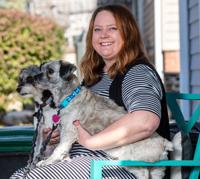
Annie Bradbury of Omaha is taking steps to avoid depression, such as getting a new dog to push her to spend time outside, as the days get shorter.
She’s right to be concerned, said Reo Newring, a clinical psychologist at Children’s Hospital & Medical Center.
When asked how difficult winter combined with COVID-19 will be for people with SAD — or those without — she was blunt: “Really hard.”
Now that the warm days of summer are over — and with them, most outdoor gatherings — Newring is predicting challenging times ahead.
“You can’t be with loved ones, you can’t interact,” she said. “There’s going to be a lot of hopelessness, sadness and anger, and that’s going to be compounded without having fun.”
Before you start thinking about crawling under the covers and trying to hibernate until spring, know that you can take steps to deal with SAD and general feelings of depression in the coming months.
Find a new hobby or learn something new, Newring said.
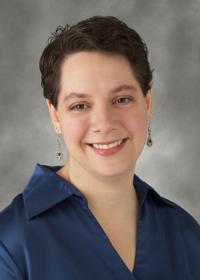
Reo Newring
“Try something you used to do or lost time for,” she said. “Watch favorite movies from when you were little. If you can get outside when it’s light, that’s a great thing to do. Switch your evening run to a morning run. Go for a walk at lunchtime.”
A glass of wine over a Zoom call with a friend can be a short-term solution.
Therapy light boxes, which mimic the sun’s rays, can also help.
Bradbury said she realized that she needed to make a plan to keep her life on an even keel.
She has started learning French on the Duolingo app. She has signed up for virtual yoga and cardio classes from Lotus House of Yoga and plans to try Peloton spin workouts as well.
She has added a second puppy to the family, and Ollie and Henry push her outside every day.
“They drive me crazy if I don’t take them for walks,” she said. “I think it motivates me, especially working from home. I walk at lunch to get out of the house. Having the dogs helps me be on a schedule, too.”
Some officials are also warning people against gathering for the holidays, and that adds another layer of depression about the winter ahead.
Newring recommends that people who can’t be with loved ones connect on the phone and through Zoom and Skype sessions in which you can hear and see each other.
Grandma can be making cookies at her house and the grandkids at theirs, and they can enjoy the same wonderful Christmas smells at both places.
If none of those things is working and you start feeling overwhelmed by feelings of sadness or depression, Newring said it’s time to call a professional.
Don’t procrastinate. Newring said she and others in her practice have been overwhelmed since May.
“And it’s getting worse. It didn’t really slow down over the summer,” she said. “Usually, people are really happy over the summer, but they haven’t been.”
It can take a week or two to get an appointment if you are a new patient. Newring said you can try some things as you wait.
“Connect with anyone that you have ever loved in your life,” she said. “That is the best thing that we have got right now. Comfort yourself. Remind yourself that this is all going to be over at some point.”
Our best staff images of October 2020
Guard

Security personnel oversee a rally supporting President Donald Trump at Eppley Airfield in Omaha on Tuesday, October 27, 2020. President Trump spoke as part of a Make America Great Again! campaign rally later in the evening.
President Trump Visits

Supporters cheer as President Donald Trump speaks at Eppley Airfield in Omaha on Tuesday, October 27, 2020. President Trump spoke as part of a Make America Great Again! campaign rally.
Snow
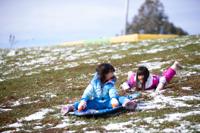
Yemin Zeng, right, pushes Yechun Zeng, both 5, on a sled down a hill at Memorial Park early Monday afternoon. Overnight, snow fell in the Omaha area but had mostly melted by the afternoon.
Jump

Millard North’s Jimmy Quaintance, left, Charlie Quaintance, center, and Barrett Luce celebrate a first-quarter touchdown against Norfolk. Jimmy threw the scoring pass to his brother, Charlie.
Ready
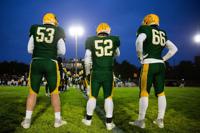
Kearney Catholic's Gavin Drumheller (53), Kale Murphy (52) and Seth Moore (66) line up as their team is introduced before the start of the Cozad vs. Kearney Catholic football game at Kearney Catholic High School on Friday, October 23, 2020.
Cold
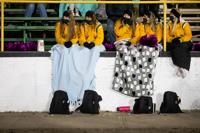
Kearney Catholic cheerleaders huddle for warmth in the fourth quarter of the Cozad vs. Kearney Catholic football game at Kearney Catholic High School on Friday, October 23, 2020. Kearney Catholic won the game 31-0.
Opposite Worlds

The Elkhorn student section storms the field as Omaha Skutt Catholic players walk off the field.
Eye on Ball

Elkhorn South's Katie Galligan (6) competes in the Elkhorn South vs. Papillion-La Vista South Metro Conference championship match at Papillion-La Vista South High School on Thursday, October 22, 2020. Elkhorn South won in five sets. Elkhorn South won in five sets.
Spooky Vote
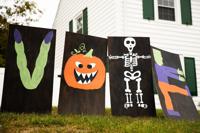
A spooky reminder to vote in a home's yard near 72nd and Cass Street in Omaha on Thursday, October 22, 2020.
Colorful Run
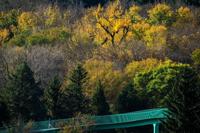
Leaves start to change color on trees as a jogger runs down the south side of the Dodge Street Pedestrian bridge, as viewed from Memorial Park on Wednesday, October 21, 2020.
High school first day

Students return to school for their first day of in person classes for the 2020-2021 school year at South High School in Omaha on Monday, October 19, 2020.
Cheer

Elkhorn South fans cheer from the stands during a timeout against Bellevue West.
Softball Champs 1

Papio pitcher Jordyn Bahl hugs head coach Todd Petersen after winning the Class A Championship over North Platte.
Softball Champs 2

Omaha Skutt Catholic second baseman Alexa Rose reacts after scoring against North Platte.
Drum
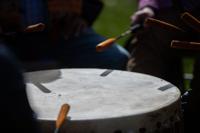
The Southern Boyz drum group strikes a drum during a memorial ceremony for Zachary Bear Heels at Schroeder Vogel Park in Omaha on Saturday, October 17, 2020.
Stiff Arm

Omaha Westside quarterback Cole Payton runs 60-yards as he stiff-arms Kansas City St. Thomas Aquinas’ Jacob Bittner in the first quarter for Westside’s third touchdown of the first quarter against at Omaha Westside on Friday, October 16, 2020.
Pumpkin Paint
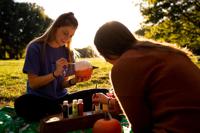
Reagan Garvey, left, and Sarah Babe, both 19 and of Omaha, paint pumpkins at Elmwood Park in Omaha on Monday, October 12, 2020.
Renovate

Renovation work continues on the site of the historic former Logan Hotel, located at 1802 Dodge St.on Monday, October 12, 2020.
Nature Color

A tree changes colors at Elmwood Park in Omaha on Monday, October 12, 2020.
Build
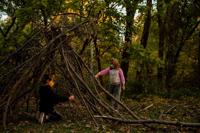
Siblings Juan Jesus Alvarez, 10, and Shantaly Alvarez, 9, of Omaha build a structure modeled after a Native American tent with branches at Elmwood Park on Monday.
Enter

Millard West takes the field before the start of the Millard West vs. Bellevue West football game at Bellevue West High School on Friday, October 9, 2020. Bellevue West won the game 42-7.
Harvest

Zach Benes harvests soybeans on farm east North of Lincoln, just east of North 40th Street, north of Interstate 80 on Wednesday, September 30, 2020.
Jump

Elkhorn South's line backer Makhi Nelson-Douglas (2) and defensive lineman Maverick Noonan celebrate after sacking Gretna quarterback Zane Flores (not pictured).
Roses

People smell the flowers in the Memorial Park Rose Garden in Omaha on Tuesday, September 29, 2020.
Friday Night Lights

Omaha Skutt's Sam Scott scores a third-quarter touchdown against Gretna.
Vice President

Vice President Mike Pence arrives at Eppley Airfield in Omaha on Thursday, October 01, 2020. The vice president spoke at PVS Structures, a metal fabricator, in Carter Lake, Iowa as part of a Make America Great Again! campaign event.
Touchdown

Gretna quarterback Zane Flores lucks up after rushing for a third quarter touchdown against Omaha Skutt.
Pet Parade

Dawn Forney, left, and Jolynn Keplinger, both of Omaha, wear Tigger and Winnie the Pooh costumes as their dogs Bitsy, a 6-year-old Maltese poodle mix and Scarlet, a 3-year-old Great Dane, wear Piglet and Eeyore costumes for the pet parade during Farnam Fest along Farnam Street in Omaha on Saturday, October 3, 2020.
First Day Back

Students arrive for the first day of in-person class for OPS elementary schools at Springville Elementary School in Omaha on Monday, October 5, 2020. Families that have opted for in-person teaching will follow a 3-2 model, with students in the classroom every other day.
marjie.ducey@owh.com, 402-444-1034
If you don’t have seasonal affective disorder but are feeling the winter blahs, one doctor offered a suggestion to try along with lots of exercise and fresh air.
She replaced the 2000-3500K bulbs in her house with the 5000K LED version.
“I found that I had more energy in the evenings during the winter with the daylight bulbs,” said Dr. Jennifer Buescher, a family physician at Think Whole Person Healthcare. “I have suggested this to many patients and friends since, and anecdotally people tell me they feel better, too.”
Buescher often arrives at work and leaves work in the dark, so the brighter daylight color of the bulbs makes her feel as though she had seen daylight.
“Similarly, choosing light fixtures with clear or white shades (rather than yellow-tinted ones) have made winter more enjoyable for me,” she said.
The latest headlines sent at 4:45 p.m. daily.
November 02, 2020 at 02:00AM
https://ift.tt/3oLv6fm
It's going to be hard: One less hour of daylight after work can have a big impact - Omaha World-Herald
https://ift.tt/2VuKK1x
Work

No comments:
Post a Comment